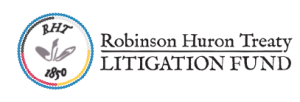 Two Sagamok Anishnaabe Elders testified on Monday, September 29, 2025, in a Toronto courtroom that a fee arrangement with lawyers who won a landmark treaty case must be honoured in keeping with Anishinaabe law and traditional honour.
Two Sagamok Anishnaabe Elders testified on Monday, September 29, 2025, in a Toronto courtroom that a fee arrangement with lawyers who won a landmark treaty case must be honoured in keeping with Anishinaabe law and traditional honour.
Elder Margaret Toulouse and Elder Nelson Toulouse said the fee agreement was well understood by the First Nations litigants throughout the court battle and was sanctified at the outset with oral and written assurances and pipe ceremonies.
The legal team ultimately obtained a settlement of $10-billion from the Ontario and federal governments for their breaches of the Robinson Huron Treaty. More billions are expected in years to come, none of which is expected to go to lawyers.
“It’s a big undertaking when you do a pipe ceremony,” Elder Margaret Toulouse told Ontario Superior Court Justice Fred Myers. “It is like a promise. You have to respect the decisions that have been made.”
Two of the 21 First Nations who signed onto the contingency fee agreement – Atikameksheng Anishnawbek and Garden River First Nation — contend that a total of $510-million that would go to the legal team is too high and should mostly be divided amongst the group of 21 First Nations.
However, the legal team has already donated half of the full amount – $255-million – to the betterment of the RHT communities. It is intended to be used for improving community health and educational systems, and to safeguard cultural traditions and language. “It was a gift,” Elder Nelson Toulouse testified in the afternoon. He said the $255- million donation was accepted ceremonially and with gratitude.
The courtroom was packed at the first day of the proceeding. Counsel on both sides made gifts of tobacco to each witness and thanked them after their testimony for providing their wisdom to the hearing.
The first lawyer to make submissions, Brian Gover, represents the legal team that spent 17 years preparing vast amounts of historical evidence and fighting the case all the way to the Supreme Court of Canada. He led off with an impassioned account of the epic proportions of the case and the $10-billion settlement.
The case was “absolutely novel,” Mr. Gover said. He said the legal team worked for seven years simply to amass a complete historical and cultural record of the context in which the Treaty was negotiated and signed. “There was enormous risk, including the risk of outright failure,” he said. “Canada and Ontario were formidable foes. It was a nation-to-nation battle.”
The hearing is scheduled to last a total of four days. Judge Myers will likely take several weeks or months to render his decision.
Elder Nelson Toulouse emphasized that the final legal victory at the Supreme Court of Canada was particularly satisfying because it specifically invoked Anishinaabe law, principles and tradition.
“The settlement money is great,” he said. “But the most important aspect for me was the recognition of our traditional governments.”
In cross-examination, Michael Rosenberg, a lawyer for the two First Nations who are challenging the fee, challenged Elder Nelson Toulouse about whether it would make more sense for such a large amount of money to be channeled into community needs.
Elder Toulouse acknowledged the size of the sum, but he said that the Anishinaabe sense of principles and honour takes precedence over any other consideration. He said that the contingency fee structure was hammered out by experienced, knowledgeable representatives of the communities who pushed back against proposals they considered too costly.
The Elder also noted that a final victory of this magnitude was beyond anyone’s imagination.
“All these people like me who were involved for years and years – we didn’t think we would see it. But we did,” he said. “We know that there was tremendous work involved. There has to be tremendous value attached to the fact that they won.”
- Tenaris Commits an additional $78,500 to Support HSCDSB STEAM Lab Programming - February 21, 2026
- Safety Reminder: Keep Children Off Snowbanks Near Power Lines - February 21, 2026
- Une élève de Wawa exerce son leadership au Sénat des élèves du CSC Nouvelon - February 20, 2026
 Wawa-news.com Local and Regional News
Wawa-news.com Local and Regional News

